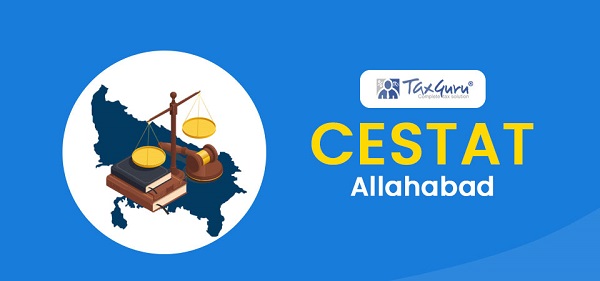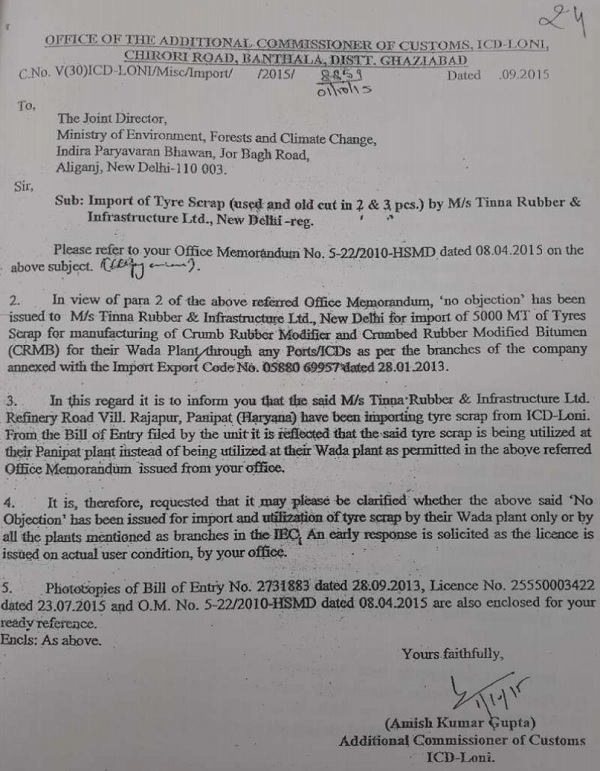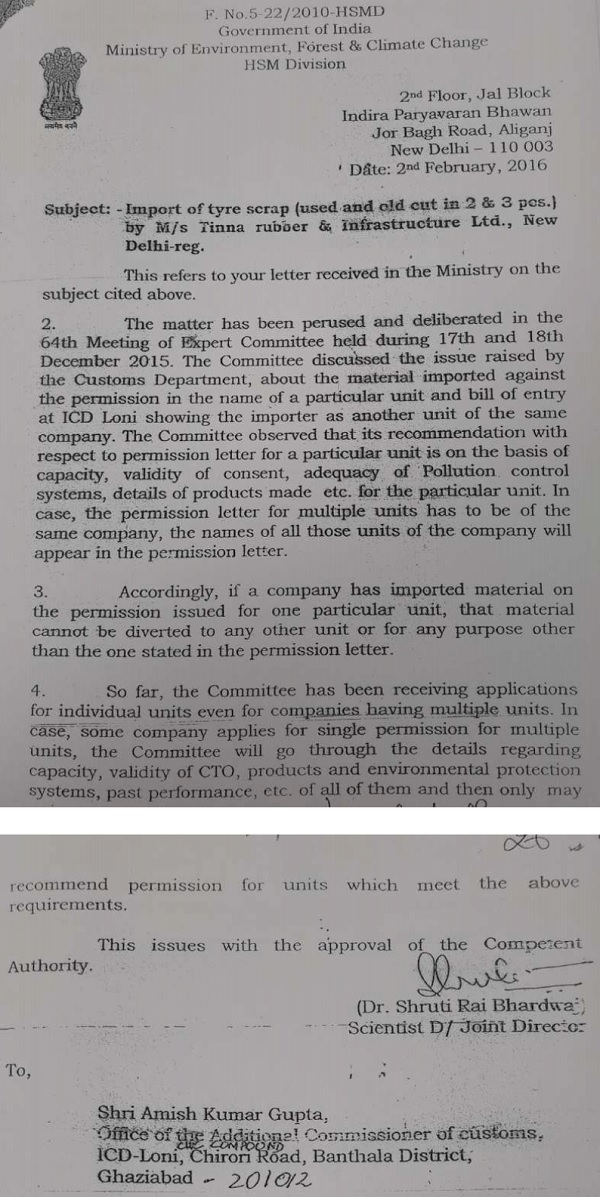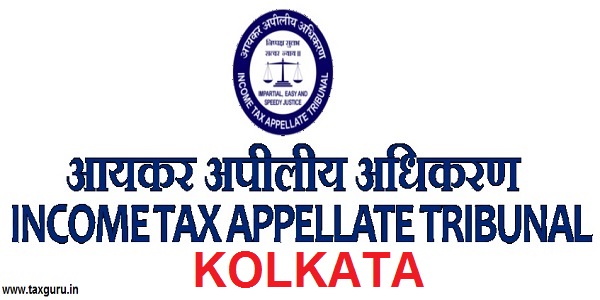
Material imported under MOEF permission cannot be diverted to any other unit: CESTAT Allahabad in Tamil
- Tamil Tax upate News
- November 13, 2024
- No Comment
- 14
- 16 minutes read
Tinna Rubber & Infrastructure Ltd. Vs Commissioner of Customs (CESTAT Allahabad)
CESTAT Allahabad held that material imported based MOEF permission by a company cannot be diverted to any other unit for any purpose other than one stated in permission letter. Accordingly, goods liable for confiscation u/s. 111(d) of the Customs Act on account of diversion.
Facts- Appellant imported two consignments of old and used cut tiers in 2 & . 3 Pcs. (arisen from old/used tires) for clearance to their Pan pat Unit. These B/Es were assessed and marked for examination with directions to ensure that the importer is an actual user and clearance of the goods was allowed provisionally.
The importer produced DGFT License and MOEF Office Memorandum vide which ‘No Objection’ had been issued to M/sienna Rubber & Infrastructure Ltd., New Delhi for import of 5000 M.T. of tires scrap for manufacture of Crumb Rubber Modifier (CRM) and Crumb Rubber Modified Bitumen (CRMB) for their Wada plant. As the B/Es were filed for their Pan pat plant in Haryana instead of Wada plant in Maharashtra, as per the conditions of MOEF O.M., the imported goods could be used only in Wada plant, not elsewhere and in case of otherwise use, the said goods were liable to be re-exported to the foreign supplier at the cost of the importer.
In respect of Pan pat Unit proceedings were initiated against the appellant for contraventions of the provisions of import and export policy for which goods became liable for confiscation u/s. 111 and for imposition of penalty on importer. Matter was adjudicated by the Joint Commissioner and imposed redemption fine of Rs.6 Lakhs u/s. 125 of the Customs Act and penalty of Rs.4 Lakhs under Rule 112(a) on the appellant.
Commissioner (Appeals) has upheld the order of Original Authority. Being aggrieved, the present appeal is filed.
Conclusion- Held that undisputedly, the goods have been sought to be cleared for Pan pat unit. On the basis of the letter issued by Ministry of Environment, Forests and Climate Change in respect of Wada unit as per the import and export policy issued by DGFT, this letter is part and appellant availed permission for Pan pat unit, the conditions of DGFT license has been valid for importation of these goods. Accordingly, the goods being not really importable or prohibited and has been rightly held liable for confiscation under Section 111 (d) of the Customs Act, for the above violation penalty imposed on the appellant under Section 112 of the Act.
FULL TEXT OF THE CESTAT ALLAHABAD ORDER
This appeal is directed against Order-in-Appeal No.NOI-CUSTM-000-APP-1282-18-19 dated 18/09/2018 passed by Commissioner (Appeals) Central Goods & Service Tax, Noida. By the impugned order Appellate Authority has upheld the Order-in-Original No.03/JC/ICD-Loin/2018 dated 07/02/2018.
2.1 Appellant had vide Bill of Entry No.2731883 dated 28.09.2015 and 2818597 dated 06.10.2015 imported two consignments of old and used cut tiers in 2 & . 3 Pcs. (arisen from old/used tires) for clearance to their Pan pat Unit.
2.2 These B/Es were assessed and marked for examination with directions to ensure that the importer is an actual user and clearance of the goods was allowed provisionally on importer’s 2 Customs Appeal No.70179 of 2019 request under P.D.Bond with directions to the importer to produce a valid MOEF permission and DGFT authorization.
2.3 The importer produced DGFT License No.0550003422 dated 23.07.2015 and MOEF Office Memorandum No.5-22/2010-HSMD dated 08.04.2015 vide which ‘No Objection’ had been issued to M/sienna Rubber & Infrastructure Ltd., New Delhi for import of 5000 M.T. of tires scrap for manufacture of Crumb Rubber Modifier (CRM) and Crumb Rubber Modified Bitumen (CRMB) for their Wada plant.
2.4 As the B/Es were filed for their Pan pat plant in Haryana instead of Wada plant in Maharashtra, as per the conditions of MOEF O.M., the imported goods could be used only in Wada plant, not elsewhere and in case of otherwise use, the said goods were liable to be re-exported to the foreign supplier at the cost of the importer.
2.4 The Joint Director, MOEF, New Delhi, in response to Loin Customs’ letter seeking clarification as to whether the above MOEF permission for import and utilization of tires scrap was issued for Wada plant only or for all the plants shown in the IEC certificate, clarified vide her office letter dated 02.02.2016 that if a company has imported material on the permission issued for a particular unit, the material cannot be diverted to any other unit for any purpose other than the one stated in the permission letter.
2.5 In respect of Pan pat Unit proceedings were initiated against the appellant for contraventions of the provisions of import and export policy for which goods became liable for confiscation under Section 111 and for imposition of penalty on importer.
2.6 Matter was adjudicated by the Joint Commissioner, vide his order in original dated 07.02.2018 he imposed redemption fine of Rs.6 Lakhs under Section 125 of the Customs Act and penalty of Rs.4 Lakhs under Rule 112(a) on the appellant.
2.7 Aggrieved appellant filed appeal before Commissioner (Appeals). Commissioner (Appeals) has upheld the order of Original Authority. Aggrieved appellant filed this appeal before the Tribunal.
3.1 We have heard Shri R.P. Jindal, Advocate for the appellant and Shri Manish Raj, Authorized Representative for the revenue.
3.2 Arguing for the appellant learned Counsel submits that-
- There is a bonafide error committed by them to the extent of permission which is in respect of Wada unit and not in respect of Pan pat unit.
- The said permission would be valid for Pan pat Unit also as the importer/exporter provides materials to all 5 units from which they are producing.
- In any case redemption fine and penalty imposed on the appellant are too harsh for such technical offences.
3.3 Learned Authorized Representative reiterates the findings recorded in the orders of the lower authorities.
4.1 We have considered the impugned orders along with the submissions made in appeal and during the course of argument.
4.2 In the impugned order, following observations has been made:-
“5.1 I find that the appellant had imported Tires Scrap cut in 2 & 3 Pcs. (arisen from old & used tires)’ vide 2 Bills of Entry filed by their Pan pat plant through ICD, Loin which are restricted goods and can be imported into India with the permission of Ministry of Environment, Forests and Climate Change (MOEF) and also require special import authorization from DGFT. The importer produced MOEF O.M. No.5-22/2010-HSMD dated 08.04.2015 and DGFT Licence No.05500003422 dated 23.07.2015 in respect of the above imported goods, which were not found proper4 Customs Appeal No.70179 of 2019 and legal. On the request of the importer, the goods were released provisionally under P.D.Bond on the conditions such as to produce required import licence, documents and information within prescribed period, pay differential duty, penalty and fine adjudged in lieu of confiscation for import without a valid licence, etc.
5.2 I also find that MOEF’s above referred O.M. dated 08.04.2015 grants ‘No Objection’ for import of 5000 M.T. of Tyres Scrap for manufacture of CRM and CRMB in Wada plant and in very clear terms, inter alia stipulates that “The import shall be only for the intended use of recovery/manufacturing/recycling at the unit and the imported material shall not be sold further.” This categorical mention of terms and conditions in MOEF’s above O.M. put forward by the importer at the time of filing B/Es, permits import of goods for Wada plant only whereas B/Es were filed for Pan pat plant, not covered by the said O.M. at all. The Joint Director, MOEF, New Delhi, further clarified vide office letter dated 02.02.2016 that if a company has imported material on the permission issued for a particular unit, the material cannot be diverted to any other unit for any purpose other than the one stated in the permission letter. Ample opportunities were given to the importer to put forth valid supporting documents but they could not furnish the same. Thus, I find that the appellant has not put forth any plausible explanation for diversion of goods rather they have admitted that they diverted the goods to their Pan pat plant due to stock shortage. The DGFT Licence No. 05500003422 dated 23.07.2015 issued to the importer clearly has a rider that “…. The import is also subject to the conditions imposed by M/o Environment, Forest and Climate Change vide O.M. No.5-22/2010-HSMD dated 08.04.2015 and such diversion of restricted imported goods is nowhere permitted in MOEF’s above referred Office Memorandum.
5.3 I further find that the importer’s contention that both, Wada and Pan pat plants are granted NOC for the same product is not sustainable as far as diversion of goods is concerned as the MOEF permission for import of restricted goods is plant specific and pollution level in the area where plant is located is one of the factors for granting the same.
5.4 I further observe that MOEF O.M. No.5-22/2010-HSMD dated 03.03.2016 granting permission to importer’s 4 plants located in Haryana, Maharashtra, Tamilnadu and West Bengal, speaks nothing about diversion of the goods. Thus, the importer’s claim is not correct that they have obtained MOEF O.M. dated 03.03.2016 covering their 4 plants such that material can be imported and diverted to any of the branches against NOC issued to one particular branch.
5.5 I further find that the importer has failed to produced any permission/ document as claimed that in order to facilitate them, MOEF has been issuing them permissions repeatedly, clearly stating that they can import tires scrap against permission granted for any specific unit which can be diverted and utilized by any other unit in case of need. This plea of the importer is not true.
On the basis of above findings, it is clearly established that the appellant had imported the impugned goods without valid authorization from DGFT and permission from MOEF.
6.0 The permission of Ministry of Environment, Forests and Climate Change (MOEF) and authorization from DGFT are the two prime and foremost requirements for import of restricted goods, such as Tires Scrap into India and the importer failed to produce the same. Besides, on the request of the importer, the goods were provisionally released under P.D.Bond and one of the conditions of the said bond was that the importer shall pay to the President, any penalty and fine that may be adjudged in lieu of confiscation of the said goods, for importation of the goods or part thereof without a valid licence. Moreover, Para 4 of MOEF Office Memorandum dated 03.03.2016 and 12.07.2017 clearly mentions and authorizes that as per Hazardous Waste Rules, 2008, the Customs Authorities at the Ports/ICDs have the responsibility to verify the documents, physically verify the material prior to clearing consignments and also required to take action under the Customs Act, 1962 and under the Hazardous and Other Wastes (Management and Trans boundary Movement) Rules, 2016 against importers found to be violating these rules. Thus, this plea of the importer is not tenable that even if there was any violation, the action was required to be taken by the MOEF and not by the Customs Authorities.
6.1 I further find that the said goods have been imported into India contrary to the law for the time being in force as per Section 111(d) of the Act, ibid and as per Section 111(0) of the Act in as much as the condition in respect of import has not been observed, the non- observance of which was not allowed by the proper officer. Thus, the goods were improperly imported and have been rightly confiscated under the Sections discussed above. Further, the quantum of redemption fine imposed under Section 125 of the Act, to the tune of Rs.6,00,000/- is quite reasonable and justifiable in view of the facts and circumstances of the case. Since on the request of the importer and reposing trust in him, the goods were released on P.D.Bond, though the same were not validly imported and required to be re-exported at the cost of the importer. At the time of clearance, the importer was aware that he did not have valid documents for import, therefore, he executed P.D.Bond and assured to produce valid paper within prescribed time limit but he, not only failed to do so but also started resorting to pleas having no substance and truth in them, this clearly, is breach of trust for which he has appropriately been fined. I place reliance on Hon’ble Supreme Court’s order in the case of M/s. Weston Components Ltd. V/s. Commissioner of Customs, New Delhi 2000(115) ELT 278 (S.C.).
6.2 As the import of goods was without valid MOEF permission and DGFT authorization, the goods were confiscated under Section 111(d) and 111(0) of the Act and the provisions of Section 112(a) of the Act are also attracted. The penalty can be imposed not only when the goods are available for confiscation but also when the goods are liable to confiscation. Section 112 (a) lays down that any person who, in relation to any goods, does or omits to do any act which act or omission would render such goods liable to confiscation under Section 111, or abets the doing or omission of such an act, is liable to a penalty. Since in the present case, the goods have been held liable to confiscation under Section 111 of the Act, I find that the imposition and quantum of penalty to the tune of Rs. 4,00,000/- under Section 112(a) of the Customs Act, 1962 is justifiable. I place reliance on Bombay High Court’s order in the case of M/s. Bussan Overseas & Properties Vs. Revenue 2004 (163) ELT (304) Boom.”
4.3 Undisputedly, the goods have been sought to be cleared for Pan pat unit. On the basis of the letter issued by Ministry of Environment, Forests and Climate Change in respect of Wada unit as per the import and export policy issued by DGFT, this letter is part and appellant availed permission for Pan pat unit, the conditions of DGFT license has been valid for importation of these goods. Accordingly, the goods being not really importable or prohibited and has been rightly held liable for confiscation under Section 111 (d) of the Customs Act, for the above violation penalty imposed on the appellant under Section 112 of the Act.
4.4 The arguments advanced by the appellant counsel vis a vis the validity of permission issued in respect of Wada Unit, for the Panipat Unit we find that the concerned Ministry has clarified contrary to the said submission. The relevant correspondence whereby the submission made has been rejected is reproduced below:

–

4.5 We do not find any error in the impugned orders as the concerned Ministry has in respect of the same consignment has clarified contrary to the stand taken by the appellant in this regard that the permission granted in respect of Wada unit in Maharashtra would be valid for the imports to be made for consumption in Pan pat Unit in Haryana. The impugned order has taken note of the above clarification issued by the administrative ministry.
4.6 While upholding the order in relation to confiscation of the impugned goods and the penalty imposed, we take note of the facts that total value of the goods was Rs.22 lakhs for which redemption fine of Rs.6 lakhs and penalty of Rs.4 lakhs has been imposed. These seem to be on higher side. We reduce the redemption find imposed to Rs.3 lakhs and penalty imposed to Rs.2 lakhs.
4.7 With the above modifications impugned order is upheld.
5.1 Appeal is partly allowed to extent indicated in para 4.6 above.
(Dictated and pronounced in open court)



